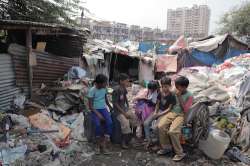47 million children in India reside in most polluted areas: Report
'Airpocalypse-II', a Greenpeace India report, said children are worst affected in states such as Uttar Pradesh, Rajasthan, Bihar, Maharashtra and Delhi respectively.

Around 47 million children in India under five years of age reside in areas where particulate matter levels exceed the prescribed limits, with 17 million among them inhabiting places where the pollution levels are twice the limits, says a recent report.
'Airpocalypse-II', a Greenpeace India report, said children are worst affected in states such as Uttar Pradesh, Rajasthan, Bihar, Maharashtra and Delhi respectively.
It said Delhi remained the worst impacted city with annual PM10 levels exceeding approximately five times the national ambient air quality standards.
According to the report, a massive part of the population i.e. 580 million or 47 per cent are living in areas where "no air quality data is available".
It claimed that out of 630 million, close to 550 million people live in areas exceeding national standards for PM10, including 180 million living in areas where air pollution levels are "more than twice the stipulated limit of 60g/m3 which has been set by the Central Pollution Control Board (CPCB).
"As many as 47 million children under the age of five years are residing in areas where PM10 levels exceeded CPCB annual limits, including 17 million children under the age of five who are in the areas where pollution levels are more than twice the limits," the report claimed.
Ranking of cities based on annual average of PM10 levels reveals that Delhi is the worst polluted city with 290 ug/m3 followed by Faridabad, Bhiwadi, Patna with annual average ranging from 272 ug/m3, 262 ug/u3 & 261 ug/m3, respectively, it said.
It said Dehradun in Uttrakhand, once thought to be a 'salubrious preserve of retiring elite', also made it to the top 10 list of worst-polluted cities with 238 ug/m3 annual average of PM10.
The report added that the most-polluted cities are spread across the Indo-Gangetic basin with the southern cities being slightly better off than their northern counterparts.
However, cities in south also need focused and time-bound action plan to bring the air quality to achieve the WHO standards, thus showing a pathway for other cities across India, it said.